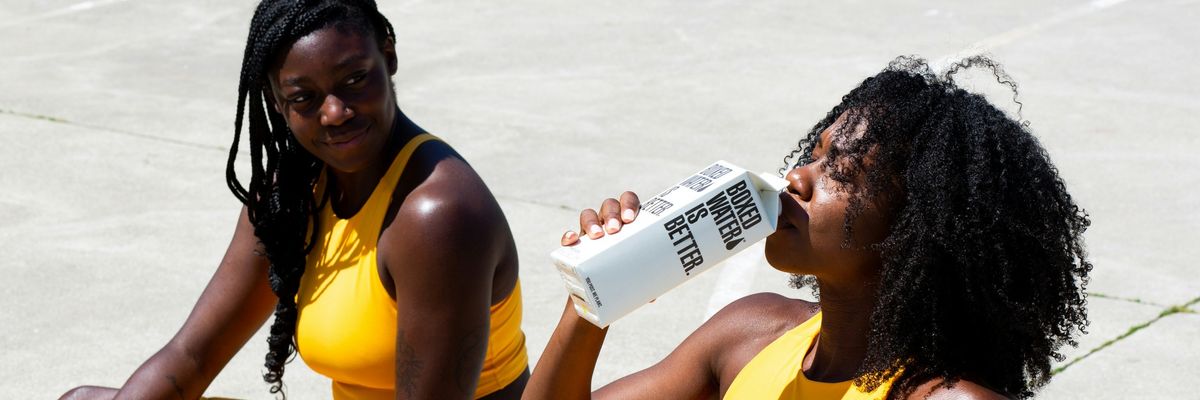
During my early years of full-time freelance consulting, I got the chance of a lifetime when I landed a huge client. As a member of this client's team, I would be witnessing the launch of an amazing initiative in Accra, Ghana, and I would be part of the ribbon-cutting. The parents of the young founder of the organization gifted me tickets and accommodations---something I will forever be grateful to them for doing.
The experience changed my life---and my perspective on travel, race, spirituality, and Africa---for the better.
When they told us we'd be visiting the slave castles on the coast, I had mixed feelings. One, I've never been a fan of reliving slavery or the history of it. (Since childhood, films like Roots would always make me feel super-sad and then super-angry for weeks on end, and I'd even fainted on a Virginia plantation tour as a teen.) Two, most of the people on the trip were white.
Someone might read that and say, "So?" but that person is disregarding the fact that some experiences, especially that of visiting a place where your ancestors were kidnapped, raped, starved, beaten, and taken away from their families forever, can be very personal and traumatic. To be honest, it was something I thought I'd rather share with my loved ones who could relate due to our shared heritage and culture.
Unapologetically Proud
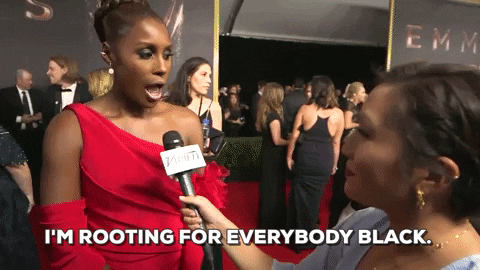
Image by Giphy
Let me explain something about myself: Though I respect and love all people, I have always been pro-black. (This does not equal anti-white, and I'll leave it at that.) I went to a historically black science- and math-focused high school, graduated from an HBCU (hey, Pirates!), and worked for and with several top black companies which I consider top without the insertion of "black" in there. I have spent my entire career giving voice to the diverse stories and experiences of black and underrepresented people, especially stories that contribute to providing balance in how black people in particular are depicted. It is something I've dedicated my life to.
I was raised in a proud family of black achievers---part of a community where educational, political and business leaders were black and where black nationalism was a way of life.
I've had my own experiences with racism, both blatant and covert, and those experiences would only strengthen my career mission as an adult.
An Emotional Shift and Lesson in Empathy
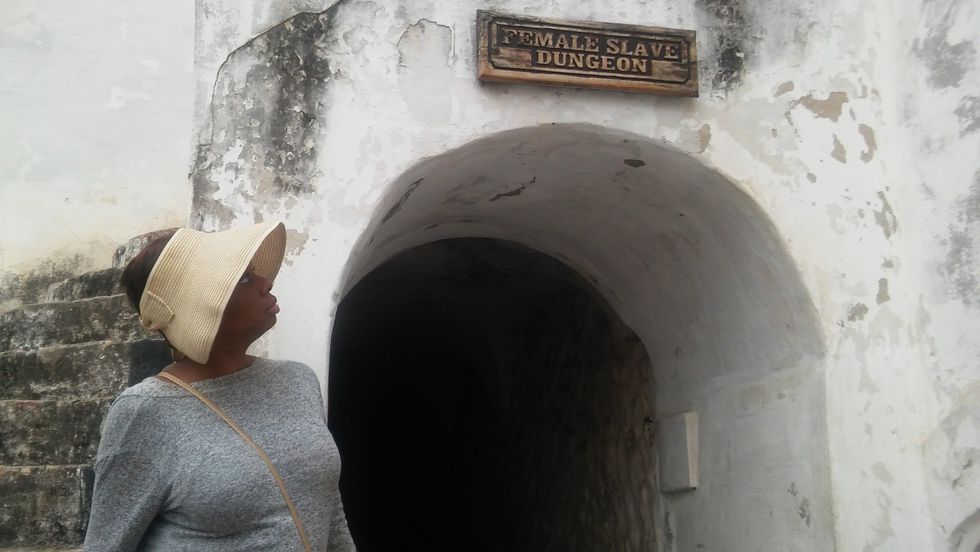
In Ghana, at the slave dungeon designated for women (Image via Janell Hazelwood)
While visiting the slave dungeons, I never really thought white people could truly understand the half of what it meant to stand in the very rooms where their ancestors packed mine in by the hundreds---including women who were not given accommodations to bathe, use the bathroom, or enjoy dignity during their menstrual periods---and treated them like animals before taking them to faraway lands to live their days in forced servitude. I knew they could offer apologies, but I felt they really couldn't relate in a way that wouldn't be perceived as forced, superficial, or something done out of obligation.
Real talk, that's how I felt.
Standing in those spaces, the sadness again turned to anger, especially when I saw other white tourists taking photos---some more in awe or disbelief than in total disgust and disappointment---and I began wishing I had taken the trip to Ghana earlier in life with my own friends and family who could really share in the moment in a way that was more private and respectful. (Disclaimer: None of the participants in our travel group were being disrespectful or insensitive. This was something I noticed in other groups.)
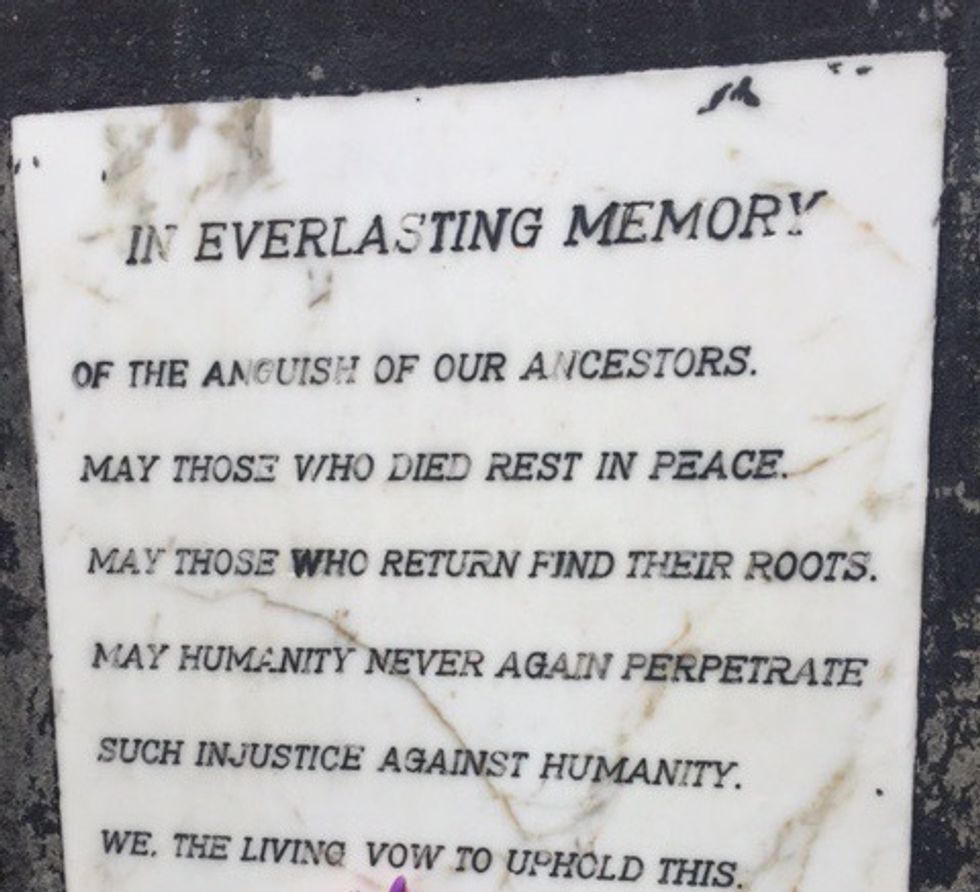
A commemoration plaque at the dungeons (Image via Janell Hazelwood)
Once the tour was over and we'd all gathered to go back to the hotel, everyone began talking among themselves, and people were asked to share their thoughts about the visit. One woman's tearful sentiments in particular really touched me. I remember her talking about how she'd studied her Caucasian family's history. She felt bad because of the things she'd uncovered, and visiting the castle really triggered even more feelings of remorse and empathy.
She said the trip really solidified for her that we all must face horrible truths about our places in history and, for her, that meant coming to a deeper understanding of the divisions of racial biases and discrimination she'd witnessed--and maybe even ignored---in her own community.
Meeting of the Hearts
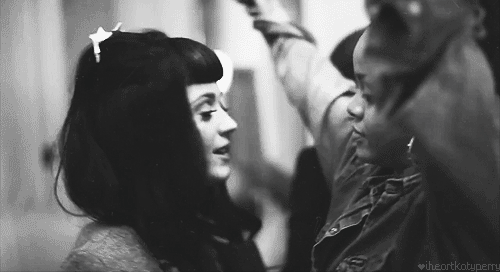
Image by Giphy
It wasn't her words that moved me. It was the tears and the transparency she showed to over a dozen people, some who hadn't known her before the trip, including me. She was a grown woman---much older than me---and I felt it took courage to express herself in the way that she did.
My anger began to melt away.
The fact that the woman even gave the experience a chance made me recognize what it meant to share in the humanity of hurt and trauma, and I respected that she even attempted to open herself up to dialogue about the biases and discrimination with all of us. That really struck a chord in me. I felt bad that I had not shown her the grace she was showing me. I'd let anger, past experiences, assumptions, and stereotypes allow me to place a wall up. I was guilty of the very thing I expected white folk not to do to me or my people.
As we continue to share stories and experiences during Black History Month, I hope we can all learn lessons of humility, empathy, and self-awareness that will allow us to move forward in a way that allows every human being to face their truths--the good, the bad, and the ugly. I pray that we do this with kindness, empathy and authenticity. This is the only way we will see a long-term resolutions to end discrimination and division among our cultures and races once and for all.
xoNecole is always looking for new voices and empowering stories to add to our platform. If you have an interesting story or personal essay that you'd love to share, we'd love to hear from you. Contact us at submissions@xonecole.com.
Featured image by Shutterstock
Your December 2025 Monthly Horoscopes Are All About Surrender & Alignment
December is about letting go. We end the year with the need for more peace, reflection, and rejuvenation, and that is exactly what December is providing for us. The Sun is in Sagittarius, and anything is possible. This is the month to believe in that and to know that the universe is supporting you. With a Supermoon in Gemini as we begin the month as well, we have an opportunity to gain the closure we have been looking for this year and to wrap up old projects, ideas, and communication breakthroughs.
This is the month to make your peace the priority and let go of trying to control the way the tides are turning. Trust in your new beginning, and give yourself time to prepare for it this month.
A big part of the clarity that is coming through this month is due to Neptune going direct in Pisces on December 10, after being retrograde here since July. With Neptune now direct, we are able to see our inspiration and creativity a little more clearly, providing the perfect energy for dreams and manifestation to be built upon. The smoke is clearing, and it’s up to you to decide what you want to do with this newfound clarity that this transit is bringing. Mercury also moves back into Sagittarius on December 11, which is great for communication and clarity, and the adventures you were trying to see through at the beginning of November come around for you again with greater purpose and support.
On December 15, Mars enters Capricorn until the end of January 2026, and this is the extra push we need to make important changes and to be on the path towards greater abundance, stability, and prosperity. Mars in Capricorn takes care of business, and we have extra energy at our disposal during this time to do so. This transit is an ideal time to focus on your career or financial goals for next year and to start putting some of these plans into motion now. A few days later, we have the New Moon of the month, which will be in Sagittarius on December 19, and this is the perfect New Moon to manifest.
The energy is high, magic is in the air, and it’s all about moving forward with the new beginnings that are inspiring you and bringing you joy to think about right now.
Capricorn Season officially begins on December 21, and this earth sign energy is how we heal, gain closure, and build new foundations in our world. With Venus also moving into a Capricorn a few days later, there is something about peace, prosperity, and security that we are gaining in life and in love as we close out the year, and this is what we need right now. This month is about reflecting on what was, letting go of old hurt, and renewing. December is an ending and a new beginning in one, and there is magic in this space to be created.
Read for your sun and rising sign below to see what December 2025 has in store for you.
 AriesKyra Jay for xoNecole
AriesKyra Jay for xoNecoleARIES
December is a full-circle moment for you, Aries. You are seeing the gifts in your world and have a lot of gratitude for the way things have come about for you as of late. There are culminations in your world that are providing you with more abundance, stability, and community, and you are exactly where you are meant to be this month. With the Sun in a fellow fire sign and in your 9th house of travel for most of the month, December is a good time to get out of your comfort zone, explore the world around you, and get your body moving.
Mars, your ruling planet, also makes a change and moves into Capricorn on December 15, which will fuel your inspiration and power in your career space. You are making a lot of professional progress as we close out the year; however, make sure to be more mindful of your competitive drive right now. The New Moon on December 19 is the perfect opportunity for you to create some new plans and goals when it comes to traveling, education, and where you want to gain some new inspiration in your world. Overall, this is a month of things coming together for you serendipitously.
 TaurusKyra Jay for xoNecole
TaurusKyra Jay for xoNecoleTAURUS
December is about trusting your intuition, Taurus. You have a lot on your mind this month, and it’s best to delegate, communicate, and allow yourself some relief by opening up to someone and not feeling like you have to hold everything in. As we begin the month, we have a Supermoon in Gemini happening in your house of income, and the plans and projects you have been building here come to fruition for you now. This is the time to gain clarity on your financial world and to take a look at what spending habits you want to let go of here as well.
With Venus in your 8th house of shared resources for most of the month, you are doing a cleanse on your commitments, partnerships, and business ventures. You are taking a look at what you want to dedicate yourself to in the future, and what commitments you may need to let go of now in order to be in the space you truly want to be, both financially and within some of your relationship dynamics. Before we end the month, we have a New Moon in this same area of your chart, and it’s time to look at the opportunities that are presenting themselves and to trust your internal guidance system to lead you forward.
 GeminiKyra Jay for xoNecole
GeminiKyra Jay for xoNecoleGEMINI
You are moving forward fearlessly this month, Gemini. December is your month of love, passion, and dignity, and you are owning the light that you shine. We begin the month with the last Supermoon of the year, happening in your sign, and you are stepping up to the plate. You are showing up, owning how much you have grown this year, and allowing yourself to heal while also acknowledging that you have done your best and you deserve to have fun in the midst of the changes you are creating.
Mercury, your ruling planet, is officially out of retrograde, and you can use this energy to the fullest potential now. With Mercury in your 7th house of love, it’s time to speak from the heart and to talk about the things that matter and that are inspiring you right now to your loved ones. You never know what kind of epiphanies you may have when you open up the conversation to others. Before the month ends, you have a New Moon in this same love area of your chart, and this New Moon is all about manifesting romance, commitment, and abundance in your world.
 CancerKyra Jay for xoNecole
CancerKyra Jay for xoNecoleCANCER
December is an opening for more love, more joy, and more freedom in your life, Cancer. You have come to a place where you hold so much gratitude in your heart for where you are today and where your heart is shining, and things come together for you with more ease right now. With the Sun in your 6th house of health, work, and daily routines for most of the month, you are getting your ducks in a row while also putting more energy and effort into taking care of yourself, your priorities, and your well-being. This month surprises you in many ways, and it’s because you are showing up.
Mars and Venus both move into your house of love, relationships, marriage, and abundance this month, and you are making strides in your love life. You have both of these opposing forces on your side and are being recognized for the love you are while also receiving the love you want. This month, overall, is about focusing more on the positives in your world and letting your heart have its joy. Before December comes to an end, there is a New Moon in Sagittarius, and this is the perfect opportunity to create the plans you want to see through next year, especially when it comes to your work life, colleagues, business ventures, and health.
 LeoKyra Jay for xoNecole
LeoKyra Jay for xoNecoleLEO
The scales of karma are balancing, and they are balancing in your favor this month, Leo. December is your month of truth, and of seeing it clearly in your world. The Sun is in your house of romance, pleasure, and happiness for most of the month, and it’s time to relax, be in the present moment, and allow what is meant to be, to be. With a Supermoon in your 11th house of manifestation as December begins, this is a powerful month for seeing your dreams come to fruition, and for feeling like the intentions you have set this year are finally here for you now.
Mars also moves into your 6th house mid-month, and this is the perfect energy to have to move into the new year. You have extra energy at your disposal right now and are feeling fearless with what is possible for you and your daily routine. Before the month ends, we also have a New Moon in a fellow fire sign, Sagittarius, and this is a breakthrough moment for you and your heart. December, overall, wants to show you how loved and supported you are and will be doing so in magical, unexpected, and concrete ways.
 VirgoKyra Jay for xoNecole
VirgoKyra Jay for xoNecoleVIRGO
December is a month of victory, Virgo. You are showing up and experiencing some new successes in your world that move you forward on your path in life. With a Supermoon in your 10th house of career as we begin the month, the effort and intentions you have made this year come into full bloom, and you are being recognized for who you are and the good work you have done. This month is all about showing up and allowing yourself to be seen and loved, knowing that you deserve the support and opportunities you are receiving.
Mars moves into Capricorn on December 15, which brings the passion and excitement into your love life, hobbies, and little pleasures in life that light you up. You want to have fun this month and are going to be walking into the new year with this fearless, happy, and spontaneous energy within you. Before the month ends, Venus also enters Capricorn, and in this same area of your chart, you have a lot to look forward to and believe in right now. Overall, December wants you to be happy and will be doing everything possible to make that happen for you. This is your month to shine, Virgo.
 LibraKyra Jay for xoNecole
LibraKyra Jay for xoNecoleLIBRA
December is a month of opportunity for you, Libra. New doors open, and you are financially making breakthroughs this month because of it. December begins with a Supermoon in your 9th house, and you are getting a clearer view of where you have been making strides in your life and how it has all brought you here to this present moment of freedom. This month is showing you what happens when you are fearless with your purpose and when you believe in yourself and what you are worthy of.
Moving further into December, Mars moves into your 4th house of home and family mid-month, and you are closing out the year in your safe spaces. You are spending more time with your loved ones and taking the time to quiet your mind and listen to what your heart has been telling you. Before the month ends, we have a New Moon in Sagittarius, happening in an area of your life that deals with communication. This is a great time for getting the answers you have been looking for and for feeling more clear-headed and confident about the decisions you are making as you move into the new year.
 ScorpioKyra Jay for xoNecole
ScorpioKyra Jay for xoNecoleSCORPIO
Patience is a virtue this month, Scorpio. December is all about remaining patient and vigilant with what you are creating in your world, and knowing that the universe has your back. It’s time to be reminded of the power of hope, and this month is an opening to greater clarity in your life. There is a lot of energy in your financial zones right now, and this is providing you with new opportunities and new insight; however, the speed at which things come about for you may feel daunting. Keep your head up and eyes focused on what you want and know that you are more than worthy of receiving it.
With Mercury in your 2nd house of income this month, December is a good time to plant new seeds and to think about where you want to be financially a month from now or even a year. This month is asking you to think bigger and to think more long-term so that you can set the appropriate plans into motion now. We also have a New Moon in your house of income before the month ends, and this is when you will see more of your dreams come to fruition in this area of your life, and have more opportunities to build. Overall, December will be teaching you a lot, Scorpio.
 SagittariusKyra Jay for xoNecole
SagittariusKyra Jay for xoNecoleSAGITTARIUS
Sagittarius Season is here, and there is a lot in store for you this month, Sag. December is all about what you are dedicating yourself to. It’s about setting your intentions and putting the work in to back up your dreams, and about getting things in order so that when the new beginnings come, you are ready for them. The Sun and Venus are in your sign for most of this month, and there are a lot of eyes on you right now. You have the potential to create a new beginning for yourself, and it’s time to invest in yourself, your love life, and your dreams.
Mercury moves into Sagittarius on December 11, and this is giving you another opportunity to see through some of the plans that you had initiated in November. Mercury was retrograde in your sign last month, and there may have been some disruptions to your vision and plans for the future, and now this energy is turning around for you. Before the month ends, we also have a New Moon in Sagittarius, and you are walking through new doors fearlessly. You are catching others by surprise by your growth this month, and you are thinking a lot about your purpose, future, and plans for the new year.
 CapricornKyra Jay for xoNecole
CapricornKyra Jay for xoNecoleCAPRICORN
December is all about the vision, Capricorn. You are moving through a lot of changes and transformations this month, yet they are giving you a chance at a new beginning in the process. You are focused more on the future and what goals you want to manifest for yourself right now, and are ready to let go of what hasn’t been working for you. With the Sun in your 12th house of closure for most of December, this is your time for healing, but remember, healing doesn’t have to be isolating or boring; you can thrive while you renew, and you are this month.
Mid-month, the excitement picks up for you, and you are feeling more energized than you have in a while. Mars moves into Capricorn until the end of January 2026, and you are being proactive with your goals, intentions, and passions. You are a force to be reckoned with this month, and you are making things happen for yourself with confidence. Capricorn Season officially begins on December 21 this year, and this is definitely speeding up your healing process. You are breaking free from what was, and with Venus also moving into Capricorn before the month ends, you are leaving this year in high spirits and with love opening a new door for you.
 AquariusKyra Jay for xoNecole
AquariusKyra Jay for xoNecoleAQUARIUS
December is all about community, creativity, and manifestation, Aquarius. This is the month to work together with others to help bring your dreams to life. You are in a space of inspiration, empowerment, and beauty, and are creating more of this energy around you and in your world. Look out for what support comes your way this month and know that you don’t have to do everything alone to succeed. With the Sun in your 11th house of manifestation and friendship, your intentions are coming to fruition, and it’s time to celebrate with the people you love and to own how far you have come this year.
On December 19, we have a New Moon in Sagittarius, lighting up your life in all of the best ways possible. This is your New Moon of freedom, victory, and magic, and you are seeing new beginnings appear that you were once just hoping for. Before the month comes to an end, Venus moves into your 12th house of closure, and after an active and successful month, you are ready to relax, heal, and give your heart some of the attention it has been asking for. You are moving into the new year with the need to release and renew what hasn’t been working in your relationships, and you are finally ready to.
 PiscesKyra Jay for xoNecole
PiscesKyra Jay for xoNecolePISCES
December is a big month for you, Pisces. You are making some huge accomplishments this month, and are feeling like everything you have been through this year has been worth it for these moments that are coming to fruition for you now. The Sun is in your 10th house of career and reputation for most of the month, and this is where a lot of your focus is right now. You are claiming your successes and putting yourself out there in ways that not only serve you, but that inspire others as well.
Neptune officially goes direct on December 10, after being retrograde in your sign since July, and you are finally seeing things a little more clearly. You are feeling renewed inspiration and passion in your life, and your intuition is your strongest asset right now. Before December comes to an end, we also have a New Moon in your 10th house of career, and what happens now not only changes things for you in the present, but it also opens new doors and what is possible for you in the new year as well. Overall, you are on top of your game this month and are owning the joy and empowerment you feel.
Featured image by Kyra Jay for xoNecole
I wish I enjoyed drinking plain ole’ water. I don’t, though, and, at this point, I doubt that I ever will. It’s not something that I’m proud of or anything, but like I’ve said in other articles on this platform, to me, water is so damn boring; it’s literally like drinking “wet air.”
That doesn’t mean I don’t accept that it’s a “necessary evil” being that we all are made up of so much water and being dehydrated (which is something that a lot of us are) can cause so many health-related issues, including blurred vision, muscle cramps, dried skin, fatigue and even moodiness.
That’s why, over the years, I’ve been intentional about figuring out ways to get more agua into my body without feeling like it’s a chore or something to dread. And now, I want to pass some of those hacks on to you, just in case you happen to totally relate to where I am coming from.
If something that you want to do more of right through here is get extra H2O into your system, here are 10 tips that can absolutely help to make that possible.
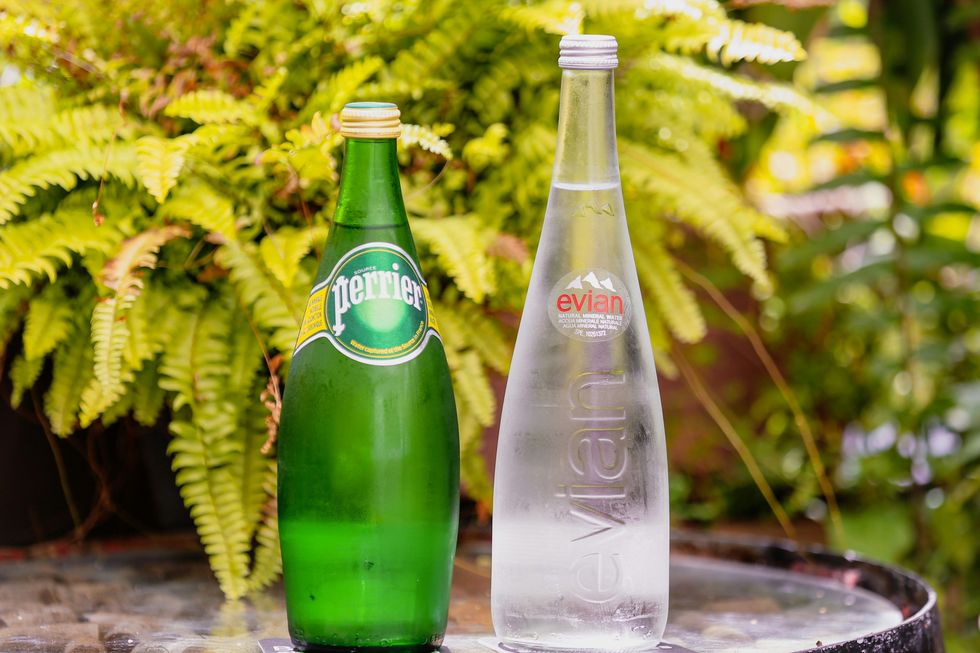
Unsplash
1. Invest in a Fun Water Bottle
There’s a far greater chance that you are going to drink water if you have a water bottle around you. So, cop yourself a cute one — one that will help you to stay motivated. A tumbler that I purchased some time back, just because I thought it was cute as hell, simply says, “Make Better Coochie Decisions” (amen?-LOL). Honestly, that doesn’t just have to apply to sex but how you treat your vagina overall — and that includes making sure that “she” has all of the fluids that she needs.
2. Try Some Sparkling Water or Mineral Water
At this point, I should take stock in Waterloo. It currently is my favorite kind of sparkling water and it has definitely made getting more water into my system easier to do. That’s because I will add some limes to it or a bit of fruit juice to it and that makes drinking water less “meh” for me. Another type of water that has bubbles in it is sparkling mineral water; it can also be beneficial since it contains magnesium, potassium and calcium.

Unsplash
3. Go Halfsies with Your Other Drinks of Choice
Speaking of making some all-natural soda (which is basically what happens when you add juice to sparkling water or sparkling mineral water), you can find yourself drinking more water while consuming less calories if you fill up your glass with half of your favorite fruit juice and half of some sparkling water. More times than not, the juice doesn’t even taste watered down. Try it before you doubt me.
4. Collect Some Infused Water Recipes
I’m forever gonna be a fan of infused water; that’s because it’s water that has fresh fruits and/or veggies in them — and it doesn’t get any healthier than that. Plus, infused water tends to take on the taste of whatever fruits or vegetables that you put into the water (if you let the stuff soak for a couple of hours), so that the water doesn’t taste so boring and bland. Wanna try a few recipes? You can check out some here and here.

Unsplash
5. Make Slushies Instead of Smoothies
Are you someone who enjoys consuming smoothies? Well, if you want to get more water into your system, how about going with a slushie instead? Although it is true that some smoothies have water as a base, the most bomb ones use milk (or a milk alternative) or yogurt. Slushies, on the other hand, typically go with crushed ice (which is frozen water) instead. That said, some (pardon the pun) cool slushy recipes can be found here, here and here.
6. Use Water As Your “Drink Chaser”
Another great thing about water is it can help to keep you from overeating; it does that by causing you to feel full if you drink it while you are eating. And speaking of calorie-counting, if you don’t want to give up your favorite drink at mealtime, one way to keep from downing 2-3 glasses of it at a time is to use water as your “chaser.” What I mean by that is, after enjoying a glass of your favorite beverage, “chase it down” with a glass of water. That should satisfy your want for what you want without overdoing it.

Unsplash
7. Eat Foods That Are High in Water Content
Another way to get more water into your body is to eat foods that have a ton of water in them. Some that top the list include lettuce (96 percent); cucumber (95 percent); zucchini (95 percent); celery (95 percent); strawberries (91 percent); cantaloupe (90 percent), and peaches (89 percent).
8. Have a Ball with Your Ice Cubes
Ice cubes are frozen water, right? That’s why most of us prefer to enjoy our drinks before the ice cubes melt because melted cubes water down whatever it is that we are consuming. And so, for this very reason, add more ice cubes to your drinks — and have fun making them. You can add juice, fruit and/or mint leaves while making your cubes. That way, they are aesthetically-pleasing; plus, they will also add more flavor to your water once the ice cubes actually melt.

Unsplash
9. Add Some Non-Alcohol Cordial to Your Water
If you’re fine with just having a tad of taste in your water, why not add a bit of cordial to it? Cordial is simply a type of tonic, syrup or sweetener (that can contain alcohol or not) that can help to make your water more…interesting. Some alcohol-based cordials can be found here. Some non-alcoholic recipes are located here.
10. Technically, Herbal Tea Counts
Tea is always gonna be my thing. That’s why I’ve penned articles on it for the site like “10 Different Ways Herbal Teas Can Fit Into Your Beauty Regimen”, “10 'Uncommon' Teas You Should Add To Your Stash (& Why)” and “I've Got 10 Teas That Will Help You To Age (Even More) Gracefully” And y’all, if you want to get a lot more water into your system yet a tall glass of water only isn’t your — pardon the pun — cup of tea, make some iced herbal tea instead.
It’s basically water with some herbs tossed in and, if you add some honey or raw organic coconut palm sugar to it, it will be a really sweet treat that will still be extremely hydrating (and very healthy) for you.
Water that is a bit more exciting for you…now. LOL.
Drink up!
Let’s make things inbox official! Sign up for the xoNecole newsletter for love, wellness, career, and exclusive content delivered straight to your inbox.
Featured image by Unsplash









